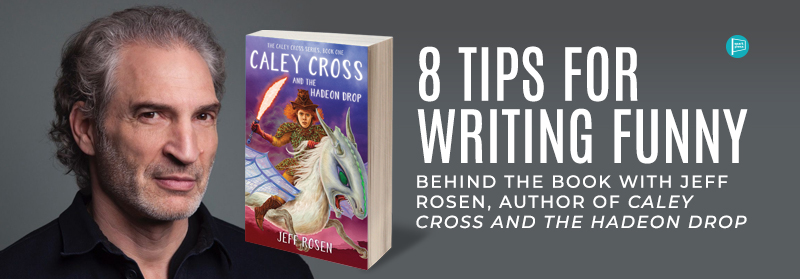
I wrote a few children’s books. Not on purpose.
– Steven Wright
I have done a lot of preschool TV creating and writing. I’m often trying to convey pro-social or STEM lessons, so humor can be useful—it’s scientifically proven that it puts you in a receptive mood and helps retain information.
Caley Cross is my first book series for Middle-Grade readers, and it’s different humor than preschool. Thus, I have eight comedy writing tips—and a few caveats.
Tip #1: Read the room.
Repeatedly falling on your bum is not that funny when you are over the age of five. More abstract humor like wordplay, farce, and puns start to work with kids over eight. Sarcasm, irony, parody, and innuendo generally land if you’re over twelve. After that, pretty much anything goes—including falling repeatedly on your bum.
Tip #2: K words.
This one is a bit controversial. Words with the “k” sound (quarantine, hydroxychloroquine) are supposed to be the funniest. It may have roots in Yiddish humor and its many words that sound like someone is choking on a herring.
Tip #3: Misdirection.
Comic writing usually requires a setup and then misdirecting the reader with the punch line. One simple way to do this is pairing two similar ideas then add a third, incongruent, idea. Example: “Making money writing fiction is simple: Create great characters, have a great plot, and earn an accounting degree.”
Tip #4: The comparison joke.
The comparison joke is like a metaphor, except funny. For example, if you want to convey that a character is boring, you might list other boring things, like rice cakes (*“K” word so it may cancel itself out!), nothingness, the English rail system, bugles … then pick the one to describe the boring person.
Tip #5: Twist.
A lot of our greatest comedy writing often relies on plot twists, using absurdity, illogic, and other shenanigans to upend expectations. One of my family’s favorite bits is the Cave of Caerbannog scene in Monty Python and the Holy Grail. The first twist is that the “deadly” beast guarding the cave is a seemingly harmless rabbit. Then it viciously kills Sir Bors. Another example of a plot twist is when the creature pops out of the John Hurt character’s chest in Alien 1. My wife always finds this hysterical.
Tip #6: Make yourself laugh first … but be careful!
After you read the funny thing you wrote the fifth time, it won’t be funny anymore and you may start to doubt yourself as a comedy writer. It’s a good idea to try out your humorous efforts on others before you hit “save.” The Marx Brothers tested all their jokes on the road before they filmed their movies.
Tip #7: Stories from real life.
Real-life is the funniest, isn’t it? Much of what people laugh at are true stories that are good to re-write and fit in your book. For example, recently my daughter, who is staying with us during the pandemic, woke up way too early because she is living in the basement and my wife and I are very loud in the morning. We live on the east coast of Canada and she is a musician who works with a lot of LA people and often doesn’t go to bed until dawn. She was so sleepy she poured the last of the ground coffee on her feet instead of the filter and then she tried to vacuum the coffee but the vacuum bag was too full because my wife and I do a lot of vacuuming these days and it exploded on her white jumpsuit, which she had just washed for a Zoom meeting or something. Then she cried. Hilarious!
Tip #8: Don’t!
If no one usually laughs at anything you say or do, or they don’t find the things you find funny funny, you should probably avoid writing humor. (*Important tip I should have remembered when I shared the anecdote in Tip #7. Daughter now not speaking to me.)
Now go be funny!

Leave A Comment